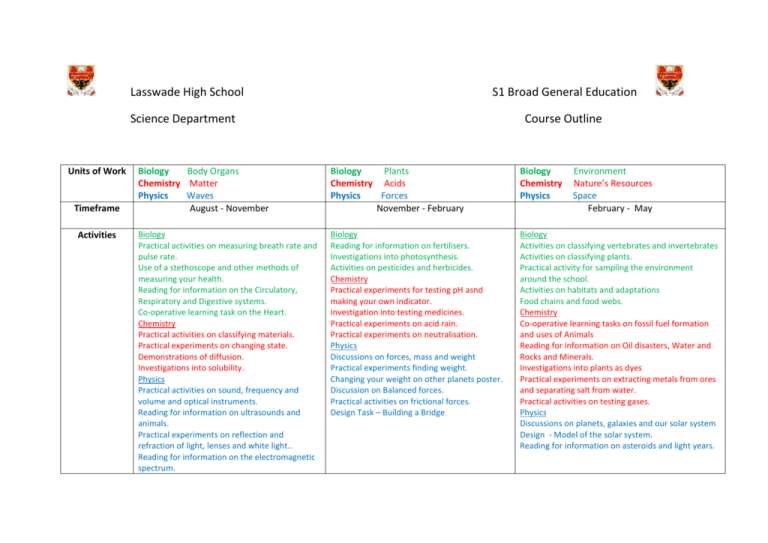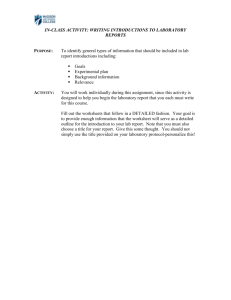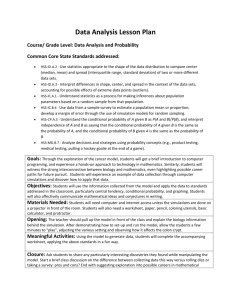Science - Lasswade High School Centre
advertisement

Lasswade High School S1 Broad General Education Science Department Units of Work Timeframe Activities Course Outline Biology Body Organs Chemistry Matter Physics Waves August - November Biology Plants Chemistry Acids Physics Forces November - February Biology Chemistry Physics Environment Nature’s Resources Space February - May Biology Practical activities on measuring breath rate and pulse rate. Use of a stethoscope and other methods of measuring your health. Reading for information on the Circulatory, Respiratory and Digestive systems. Co-operative learning task on the Heart. Chemistry Practical activities on classifying materials. Practical experiments on changing state. Demonstrations of diffusion. Investigations into solubility. Physics Practical activities on sound, frequency and volume and optical instruments. Reading for information on ultrasounds and animals. Practical experiments on reflection and refraction of light, lenses and white light.. Reading for information on the electromagnetic spectrum. Biology Reading for information on fertilisers. Investigations into photosynthesis. Activities on pesticides and herbicides. Chemistry Practical experiments for testing pH asnd making your own indicator. Investigation into testing medicines. Practical experiments on acid rain. Practical experiments on neutralisation. Physics Discussions on forces, mass and weight Practical experiments finding weight. Changing your weight on other planets poster. Discussion on Balanced forces. Practical activities on frictional forces. Design Task – Building a Bridge Biology Activities on classifying vertebrates and invertebrates Activities on classifying plants. Practical activity for sampling the environment around the school. Activities on habitats and adaptations Food chains and food webs. Chemistry Co-operative learning tasks on fossil fuel formation and uses of Animals Reading for information on Oil disasters, Water and Rocks and Minerals. Investigations into plants as dyes Practical experiments on extracting metals from ores and separating salt from water. Practical activities on testing gases. Physics Discussions on planets, galaxies and our solar system Design - Model of the solar system. Reading for information on asteroids and light years. Significant Aspects of Learning Pupils should be able to: Pupils should be able to: Pupils should be able to: demonstrate a secure knowledge and understanding of the big ideas and concepts of the sciences particularly in body organs, matter and waves. demonstrate a secure knowledge and understanding of the big ideas and concepts of the sciences particularly in plants, acids and forces. demonstrate a secure knowledge and understanding of the big ideas and concepts of the sciences particularly in environment, nature’s resources and space. Identify a number of key questions and formulate hypotheses and predictions based on information, observations and knowledge Interpret and analyse the data and information and establish relationships between variables and link to the original hypothesis Design procedures to test an hypothesis, controlling and varying an increased number of more complex variables Anticipate and apply safety measures to control all risks and hazards Increasingly take initiative in decision making about samples, measurements, equipment and procedures to use. Effectively evaluate range of aspects of the investigation/enquiry including relevance and reliability of evidence Express informed views, both orally and in writing. Present a reasoned argument based on evidence, demonstrating understanding of underlying scientific concepts Express informed views, both orally and in writing. Present a reasoned argument based on evidence, demonstrating understanding of underlying scientific concepts Communicate effectively in a range of ways Discuss science topics in real-life contexts. Demonstrate awareness of their own impact on the world Express informed views, both orally and in writing. Present a reasoned argument based on evidence, demonstrating understanding of underlying scientific concepts Demonstrate increased awareness of creativity and inventiveness in science, the use of technologies in the development of sciences, and the impact of science on society. Develop skills and attributes of scientifically literate citizens Develop inquiry and investigative skills. Develop scientific analytical thinking skills Develop skills and attributes of scientifically literate citizens Homework Assessment Body Organs K&U Worksheet – Digestion or Skills Worksheet – Pulse rate Matter Skills Worksheet – Cooking Faster or K&U Worksheet – On the Move Waves Skills Worksheet – Sun Cream or K&U Worksheet - Waves Body Organs 1. End of Unit assessment 2. Oral Presentation on Doctor’s Dilemma Matter 1. End of unit assessment Waves 1. End of Unit assessment 2. Information Leaflet on The Electromagnetic Spectrum Plants Skills Worksheet – Growing Grass or Skills Worksheet – Mineral and Plants Acids Skills Worksheet – Plotting a Graph or Research Project on Acid Rain Forces K&U Worksheet – Forces, Mass and Weight or K&U Worksheet - Friction Plants 1. End of Unit assessment – Farmer’s Report Environments Skills Worksheet – Sample Sizes Acids 1. End of Unit assessment 2. Family Health Page on Everyday Neutralisations for Families Forces 1. End of Unit assessment 2. Poster on Your Weight on other Planets Nature’s Resources 1. End of Unit assessment Nature’s Resources K&U Worksheet – Nature’s Resources Space Research Project on The Space Race or K&U Worksheet – Your place in the Universe Environments 1. End of Unit assessment 2. Design Task – Wildlife Park Space 1. End of Unit assessment 2. Project – Is there life on other planets? What success could look like Biology Exploring the structure and function of organ systems and relating this to the basic biological processes required to sustain life. Exploring the role of technology in monitoring health and the quality of life. Chemistry Contributing to experiments and investigations to develop an understanding of models of matter and apply this to changes of state and the energy involved as they occur in nature. Participating in practical investigations into solubility using different solvents and applying learning to solve everyday practical problems. Physics Explore the refraction of light when passed through different materials, lenses and prisms and explain how light can be used in a variety of applications. Explore radiations beyond the visible and describe an application, discussing the advantages and limitations. Biology Collaborate on investigations into the process of photosynthesis and demonstrate an understanding of why plants are vital to sustaining life on Earth. Explain the use of different types of chemicals in agriculture and their alternatives and evaluate their potential on the world’s food production. Chemistry Explain some of the processes which contribute to climate change and discuss the possible impact of atmospheric change on the survival of living things. Participate in practical activities to compare the properties of acids and bases, and demonstrate ways of measuring and adjusting pH. Describe the significance of pH in everyday life. Physics Contribute to investigations of energy loss due to friction and suggest ways of improving the efficiency of moving systems. Collaborate in investigations into the effects of gravity on objects and predict what might happen to their weight in different situations on Earth and in space. Biology Sample and identify living things from different habitats to compare their biodiversity and suggest reasons for their distribution. Chemistry Differentiate between pure substances and mixtures and select appropriate physical methods for separating mixtures. Participate in practical activities to extract useful substances from natural resources. Physics Use knowledge of our solar system and the basic needs of living things, produce a reasoned argument on the likelihood of life existing elsewhere in the universe. How Parents/Carers can support the coursework Click the links below; watch the videos, read the text or play the game and discuss with your child: Click the links below; watch the videos, read the text or play the game and discuss with your child: Body Organs Digestion, Lungs and Heart Videos The Heart The Lungs The Digestive System Plants Photosynthesis Videos Photosynthesis Fertilisers and pesticides Environment Habitats, Food Webs and Adaptations Videos Habitats Food Webs Adaptations Acids Acids & Alkalis, pH and Neutralisation Videos Acids and Alkalis Neutralisation Nature’s Resources Uses of Metals and other materials Videos Formation of Coal. Oil and Gas Water Forces Balanced & Unbalanced Forces, Weight & Gravity and Frictional Forces Videos Balanced and Unbalanced Forces Weight & Gravity Space Gravity, Planets and Light Years Videos Our Solar System Light Years Life in Space Matter Particle Models and Solubility Videos Particle Models Melting, Boiling, Condensing and Freezing Solubility Waves Sound and Light Videos Sound Light The Electromagnetic Spectrum Encourage pupils to start thinking of all the different areas of their life that Science affects. This could be done by watching the news for scientific reports and therefore the impact that science has on our environment and society. Or consider life without any technology! Encourage pupils to think about jobs which involve science. This could be done by looking at these articles STEM COOL JOBS Top 10 Children's Jobs and/or talking to any family or friends with jobs in the science sector. Click the links below; watch the videos, read the text or play the game and discuss with your child: Encourage pupils to take opportunities to investigate the world around them. This could be done by visiting places like Dynamic Earth, the Glasgow Science Centre, the National Museum of Scotland or even taking a trip to your local park to look at the local wildlife..


